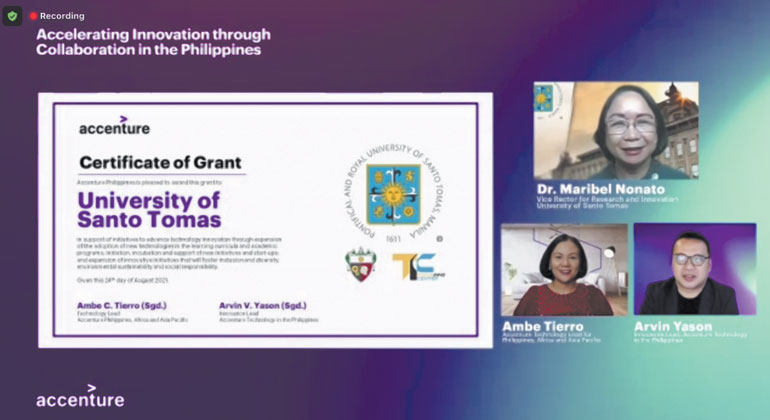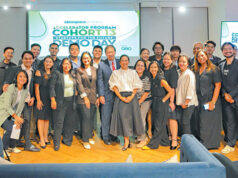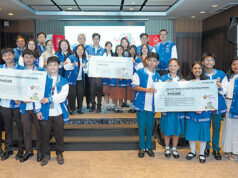
Grant to support innovation projects, healthcare startups
The University of Santo Tomas (UST) will have an Internet of Things (IoT) laboratory through the grant awarded by the multinational technology and professional services firm Accenture. UST, through the College of Information and Computing Sciences (CICS) and the DOST-TOMASInno Center, has secured funding from the firm in August last year. The grant will focus on industry innovation initiatives and healthcare startups.
The UST CICS will put up the IoT laboratory as part of the industry innovation initiatives.
Dean Jerralyn T. Padua of CICS said, “[IoT] is important in creating a framework in distance education, with all the important components in place such as wearables [such as smartwatches], cameras, microphones, cloud storage that are all connected to a learning management system.”
“This technology can aid teachers in monitoring attendance, behavioral indicators, and even emotional states. It is also helpful in analyzing data captured in the administration of practical exams and other assessments,” she added.
The IoT laboratory will be housed in the Blessed Pier Giorgio Frassati, O.P. Building. According to Ms. Padua, while the laboratory will remain under the administration of CICS, it will be shared with other academic units for multi-disciplinary research projects as well.
Looking forward, the CICS dean believes IoT would continue to benefit the university even in the post-pandemic in-person classes scenario.
The IOT can provide interconnected emergency alert buttons in classrooms, utilize data from the occupancy sensors to capture attendance in a particular class, and generate attendance monitoring reports for both faculty members and students.
Furthermore, through the occupancy sensors paired with devices like laptops or tablets, the IoT-connected lights and temperature controls can be programmed to turn off when a room is vacant. Hence, this can help improve building efficiency and reduce energy waste.
Another emerging technology that will be developed through the grant is Extended Reality (XR), an umbrella term for immersive technologies. Instruction delivery can be supported by providing platforms to augment learning through simulated environments, especially for the Enhanced Virtual Mode already in place.
One subset of XR is Augmented Reality, which can make instructors present virtual examples of concepts and add gaming elements to give textbook material support.
Ms. Padua said they expect to complete the acquisition of equipment including drones, swarm robots, robotic arms, and other learning materials as well as the training and course content development by the current academic year to make it available to students by A.Y. 2022-2023 at the latest.
Meanwhile, aside from the support to CICS, the funding will be shared with selected healthcare startups of the UST DoST-TOMASInno Center, the university’s official technology business incubator.
UST is among the 10 Metro Manila-based partner institutions that received the Accenture grant last year.
“The grant is expected to be the start of more collaborations with Accenture, with the goal of providing the most fitting learning environment for our students, to help them be ready to take on actual and real-life projects,” Ms. Padua said.
Arvin Yason, innnovation lead for Accenture Technology in the Philippines, said the grant will enhance the content of the schools’ technology curriculum, fund research and publication on emerging technologies, and explore other activities that will facilitate the adoption of these technologies in the academe and their incubated startups. — Chelsey Keith P. Ignacio



